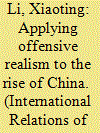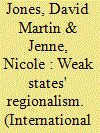|
|
|
Sort Order |
|
|
|
Items / Page
|
|
|
|
|
|
|
| Srl | Item |
| 1 |
ID:
145769


|
|
|
|
|
| Summary/Abstract |
This study employs offensive realism to provide a baseline for assessing Beijing's strategic choices in dealing with regional neighbors. In theory, when an ascending power is not yet capable of dominating its home region, it would strive foremost to prevent external powers from extending their influence in its vicinity. To attain that goal, it will likely adopt a carrots-and-sticks strategy, by rewarding some neighbors and punishing others according to their readiness to accommodate its ascendance and keep a cautious distance from external powers. Empirically, China's management of territorial disputes from the 1950s onward is quite consistent with these theoretical expectations. Viewed in this light, restraint and assertiveness are not inversely related in Chinese foreign policy behavior. Rather, they are two sides of the same coin and serve the same overriding purpose of countering adversarial (especially US) influences in China's neighborhood.
|
|
|
|
|
|
|
|
|
|
|
|
|
|
|
|
| 2 |
ID:
145767


|
|
|
|
|
| Summary/Abstract |
This article demonstrates that donors seek the optimal allocation of foreign aid by matching specific recipients with specific concessions. A formal model shows that aid encourages more democratic recipients to participate in costly collective actions to produce transnational public goods. Democratic political institutions mitigate recipient leaders' perverse incentives to divert aid from collective effort to pork-barrel spending when aid is tied to an opportunity to produce such goods. This commitment to effort in turn incentivizes other participants to cooperate, which is required for the operation to succeed. In contrast, donor-specific concessions are bought from less democratic recipients. I test the above claims against data on US multilateral coalitions providing regional security and data on United Nations (UN)-voting alignment. The results confirm that the US faces a tradeoff between the two concessions and that it buys cooperation in peacekeeping operations from more democratic recipients, while buying off predominantly autocratic recipients in the UN General Assembly.
|
|
|
|
|
|
|
|
|
|
|
|
|
|
|
|
| 3 |
ID:
145771


|
|
|
|
|
| Summary/Abstract |
By examining America's handling of the Phantom sale to Israel in light of the Middle East peace initiative, this paper will contend that, prior to the birth of America's unequivocal pro-Israeli stance, the Johnson administration viewed the Israeli–Jordanian negotiations simply as a spur to the neighboring Arab states to agree peace terms, thereby stemming the Soviet influence. Using the Phantom deal as leverage to coax Israel towards peace, while also reassuring them vis-à-vis national security, would therefore help peace become a reality. However, the approach failed, and so the Johnson administration had no choice but to give Israel the Phantoms, without exacting any corresponding peace concessions. This paper will therefore contend that the Phantom sale epitomized the failure of the Johnson administration's peace initiative, concluding that not only the power of lobbying and Israel's increasing strategic importance, but also this very failure, helped create America's de facto pro-Israeli policy.
|
|
|
|
|
|
|
|
|
|
|
|
|
|
|
|
| 4 |
ID:
145770


|
|
|
|
|
| Summary/Abstract |
When Kim Dae-jung and Koizumi Junichiro visited Pyongyang in 2000 and 2002, their visits facilitated a perception shift toward North Korea in South Korea and Japan. This was a consequence of the two democratic societies expanding and redefining the acceptable boundaries of their national security identities and principles in a changing regional environment. Although the expansion of societal security discourse did not lead extreme ‘revisionists’ to implement drastic strategic policy transformations in either country, it did provoke a ‘mutual security anxiety’ between the South Korean and Japanese publics, as they felt increasingly uncertain about each other's future security trajectory. This mutual anxiety, in which both countries tend to view each other as potential security risk, while overlooking the existence of moderate democratic citizens on the other side, continues to provide a powerful ideational undertone to the bilateral relationship, which contributes to persistent misunderstanding at various levels.
|
|
|
|
|
|
|
|
|
|
|
|
|
|
|
|
| 5 |
ID:
145768


|
|
|
|
|
| Summary/Abstract |
Since the Association of Southeast Asian Nations (ASEAN) expanded its institutional outreach to span the broader Asia Pacific and new policy areas, a dominant orthodoxy has placed the organization at the center of the region's international order. More recently, uncertainty in the context of China's rise sheds doubt on ASEAN's apparent centrality to its procedurally driven transformation of foreign relations across East Asia. While theories of cooperation explain why and when minor powers choose to pool their resources, the reverse logic has hardly been considered. This paper shows that the particular type of ASEAN regionalism is not only a product of weak states' cooperation but that the lack of capacity also sets the limits for the regional project. Two case studies on intramural security elicit the limited effectiveness of ASEAN's endeavor to develop into a security community. Meanwhile, as an examination of the South China Sea dispute demonstrates, its attempt to export its norms has rendered it vulnerable to the intervention of more powerful actors and increasingly side-lined by the evolution of great power rivalry.
|
|
|
|
|
|
|
|
|
|
|
|
|
|
|
|
|
|
|
|
|